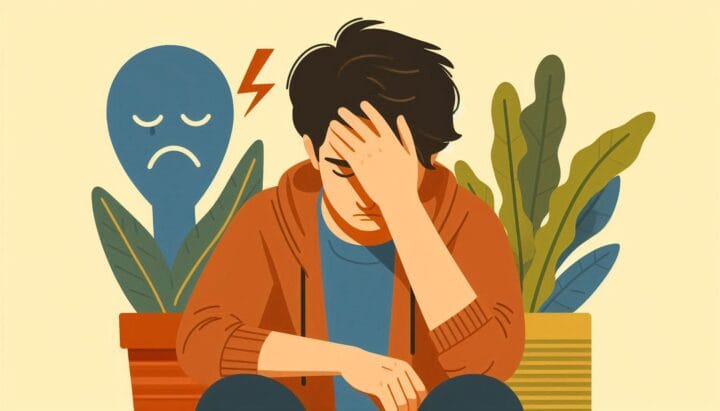Can Chronic Pain Cause Depression?
Table of Contents

Can Chronic Pain Cause Depression?
Living with chronic pain is tough. It’s not just about the physical discomfort – it messes with your whole life. And here’s the kicker: it can seriously impact your mental health too. Let’s dive into the connection between chronic pain and depression.
The Pain-Depression Link
Chronic pain and depression often go hand in hand. It’s like they’re dance partners, but the kind you definitely don’t want at your party. When you’re dealing with constant pain, it’s no surprise that your mood might take a nosedive.
How Common Is It?
Studies show that up to 85% of people with chronic pain also experience severe depression[1]. That’s a staggering number. It’s not just a coincidence – there’s a real connection here.
Why Chronic Pain Can Lead to Depression
Physical Toll
Living with chronic pain is exhausting. It can mess with your sleep, zap your energy, and make even simple tasks feel like climbing Mount Everest. When your body’s constantly fighting, your mind gets worn down too.
Emotional Impact
Chronic pain can make you feel helpless and frustrated. You might start avoiding activities you used to love, leading to isolation and a sense of loss[1].
Brain Chemistry
Pain and depression share some of the same neural pathways in the brain. They both affect neurotransmitters like serotonin and norepinephrine[3]. It’s like they’re speaking the same language in your brain.
The Vicious Cycle
Here’s where it gets tricky: pain can cause depression, and depression can make pain feel worse. It’s a nasty feedback loop that’s hard to break.
Pain Intensifies Depression
When you’re in constant pain, it’s hard to stay positive. You might start feeling hopeless or worthless, classic signs of depression.
Depression Amplifies Pain
Depression can lower your pain threshold, making everything hurt more. It’s like turning up the volume on your pain signals[5].
Recognizing the Signs
It’s crucial to spot the symptoms early. Look out for:
- Persistent sadness or irritability
- Loss of interest in activities
- Changes in sleep or appetite
- Difficulty concentrating
- Feelings of hopelessness
Breaking the Cycle
Treating chronic pain and depression often requires a two-pronged approach. Here’s what can help:
Medication
Antidepressants can sometimes pull double duty, helping with both mood and pain[2]. Pain medications might also provide some relief.
Therapy
Cognitive Behavioral Therapy (CBT) is a rockstar in treating both conditions. It helps you change negative thought patterns and develop coping strategies[2].
Lifestyle Changes
Exercise, even gentle movement, can boost mood and reduce pain. Mindfulness and relaxation techniques can also be game-changers[1].
The Importance of Support
Don’t go it alone. Reach out to friends, family, or support groups. Talking to others who get it can make a world of difference.
Hope on the Horizon
Remember, having chronic pain doesn’t mean you’re destined for depression. With the right treatment and support, many people find ways to manage both conditions and improve their quality of life.
Conclusion
Chronic pain and depression are closely intertwined, but understanding this connection is the first step in breaking free. If you’re dealing with chronic pain and feeling down, don’t brush it off. Reach out to a healthcare provider. There are ways to feel better, both physically and mentally. You don’t have to suffer in silence.
FAQs
- Can treating depression help with chronic pain?
Yes, treating depression can often lead to improvements in chronic pain symptoms. - Are there specific types of chronic pain more likely to cause depression?
While any chronic pain can potentially lead to depression, conditions like fibromyalgia and neuropathic pain are often strongly associated with depressive symptoms. - How quickly can depression develop after the onset of chronic pain?
It varies from person to person, but depression can develop within weeks to months of chronic pain onset. - Can children with chronic pain develop depression?
Yes, children and adolescents with chronic pain are also at risk for developing depression. - Is it possible to have chronic pain without developing depression?
Absolutely. While there’s a strong link, not everyone with chronic pain will develop depression. Proper pain management and mental health support can help prevent it.
Citations:
[1] https://www.medicalnewstoday.com/articles/chronic-pain-depression
[2] https://www.healthline.com/health/chronic-pain/chronic-pain-and-depression
[3] https://www.ncbi.nlm.nih.gov/pmc/articles/PMC5494581/
[4] https://www.ncbi.nlm.nih.gov/pmc/articles/PMC9509520/
[5] https://www.mayoclinic.org/diseases-conditions/depression/expert-answers/pain-and-depression/faq-20057823
[6] https://www.webmd.com/depression/depression-chronic-pain
[7] https://www.health.harvard.edu/mind-and-mood/pain-anxiety-and-depression
[8] https://healthsciences.arizona.edu/news/releases/study-shows-millions-people-live-co-occuring-chronic-pain-and-mental-health-symptoms













Post Comment